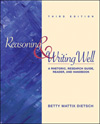To land a part-time or full-time position that starts you on your career path, you need to gain an interview and convince an employer that you are the best applicant for the job. Let's take a look at the major steps that can help you succeed: - Research your career path.
- If you lack job experience, consider a part-time job or internship.
- Search for a job.
- Prepare a résumé and cover letter.
- Prepare for the interview and follow up.
1. Research you career path. On campus, visit your college career center
and library to find career assistance and resources. On the Internet Careerbuilder.com
is a good place to start. Or you might search your area of interest directly;
for example, "business" + "internships" + "undergraduate" yields ten pages of
listings. Or consult the Internet Career Directory in chapter 30 of Reasoning
and Writing Well, third edition, which provides a list of valuable online
resources. Here are three other sites you might try: 2. If you lack job experience, consider a part-time job or internship.
Being able to juggle classes and a job well reveals motivation and good time
management skills. If you are unable to find a satisfactory part-time job, you
might consider an internship. Although many internships have no salary, they
do provide actual work experience and job contacts. 3. Search for a job. The best way to find a local job is by word of
mouth. Check around campus to see if any tutoring, lab, or other positions are
open there. Watch the windows of stores and businesses for postings of jobs.
Read the want ads in local newspapers regularly. 4. Prepare a résumé and cover letter. Your résumé
is your ambassador, so take special care in compiling it. Leave plenty of white
space and plan a neat layout. Proofread several times to weed our errors. To
decide whether a functional or chronological résumé will work
best for you, consult chapter 30 of Reasoning and Writing Well, third edition.
The directions and examples there will help you identify your qualifications
and the needs of potential employers, write a service-oriented job objective,
sort your skills and accomplishments, and organize the major sections in the
best order for you. - E-mail and scannable résumés. Since an employer may
use a scanner or ask you to e-mail a cover letter and résumé,
chapter 30 provides ten guidelines for e-mail messages, as well as directions
for e-mail résumés and scannable résumés.
- Importance of a cover letter. Employers are often deluged with applications,
and a quick reading of a cover letter may determine whether or not your résumé
is read. To catch the reader's interest, create an appropriate opening. Chapter
30 explains four types of openings for cover letters and includes examples
of openings, as well as entire letters.
5. Prepare, interview, and follow up. To prepare for an interview, write
out questions that you may be asked and jot down answers. Be prepared to talk
about your specific projects, skills, and accomplishments and link them to the
job. The connection may not be obvious. (See "Connect the Dots," a case study
in chapter 30.) In short, consider how you can be an asset to the employer.
- Before an interview, go to the company Web site. Familiarize yourself
with the company and its history so that you can consider how to fit in. Print
out any pertinent facts that you might use in the interview.
- Plan your appearance carefully. Check to see that your outfit is
appropriate, pressed, and immaculate. Does it still fit well? Are shoes polished
and shining? Do your hair and nails need a trim? Good grooming is essential.
Cover any tattoos; remove studs or gaudy jewelry.
- Be polite. Arrive a few minutes early. Take a copy of your résumé
in case someone else has it. Smile and shake hands if a hand is extended.
Do not sit until invited. Do not touch the interviewer's desk. Do not chew
gum, eat candy, or smoke. Listen attentively and ask a few appropriate questions
when pauses occur. Use your own pad and pen to jot down any needed information.
Thank the interviewer and leave. Do not attempt to prolong the interview.
- Send a thank-you letter. Mail your letter the same day or the next
morning. Conveying appreciation and interest in the job will give you an edge.
(See chapter 30 for examples.)
- Follow up. If given a date when the position is to be filled and
you haven't heard anything, phone once or write a letter. If you do not get
the position, you might ask to be kept in mind.
-- Betty Dietsch |



 2003 McGraw-Hill Higher Education
2003 McGraw-Hill Higher Education